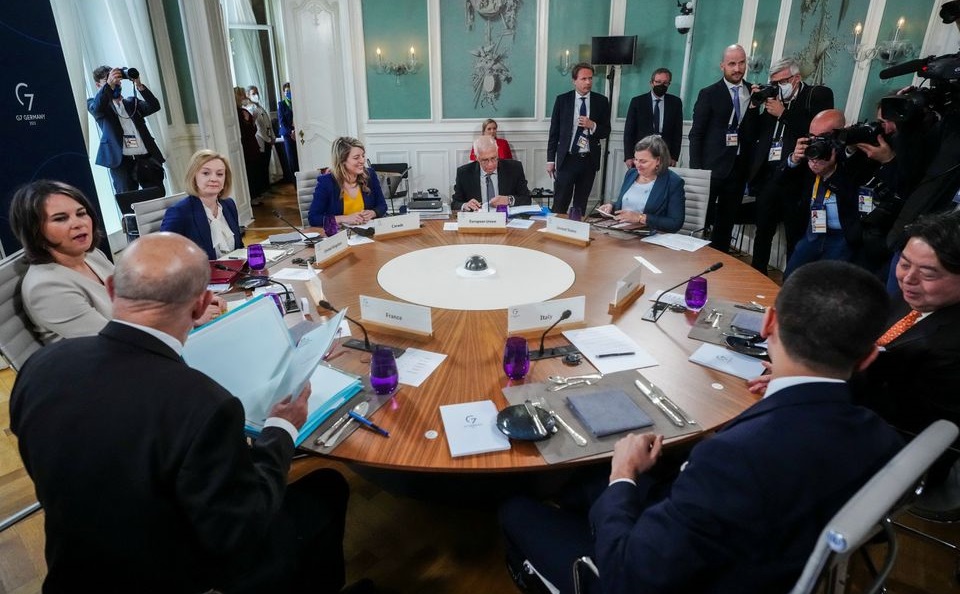The G7, in the foreign minister meeting in Germany on the 12th of May, sent a clear warning to Iran on the consequences of letting slip a potential agreement on Iran’s nuclear program that could reduce the current tensions that are being felt by the international community. The most important message from that meeting is the blame that the foreign ministers placed on Iran for the failure of the talks, and the focus placed on the negative consequences of Iran’s regional interference. The G7 indicated the possibility of reopening contentious issues with Iran and exposing more of its human rights abuses.
Although the Russian Ukrainian war garnering special attention during the three-day meeting, other issues, especially the status of negotiations on the Iran nuclear deal, were also discussed. The foreign ministers stressed the negative consequences of squandering the opportunity presented by the visits by of Joep Borrell, the High Representative of the EU for Foreign Affairs and Security Policy, and Enrique Mora, his chief of staff, during the month of May. Following these visits, Borrel announced that sufficient progress had been made to relaunch the negotiations.
The statements by the ministerial meeting imply that the G7 countries are keen to send a number of messages to Iran, including:
Iran will be Blamed if Negotiations fail: Iran has responded positively to efforts to restart the negotiations, not only because it wishes to reach a deal, but also to avoid being blamed for their failure. However, Iran continues to put the blame on the US, declaring the deal is in fact ready if the Biden Administration displayed a political will to sign. The statement from the G7 indicates that the G7 will place the blame on Iran if the negotiations fail, and that this would have negative consequences for Iran on many levels.
The G7 Focus on the IRGC’s negative role in the region: The statement from the G7 ministerial meeting indicates that these countries have come to perceive that the activities of the IRGC in the region have a negative effect on its security and stability, especially in what are known as “crisis countries”. This shows that the G7 are in line with the view, in the US, to not remove the IRGC from the terrorist list of the US State Department, as Iran is demanding as a condition for concluding an agreement.
Widening the range of contentious issues: The stance taken in this meeting indicates G7 countries are linking instability in the Middle East to the military support that Iran is providing to several militias in the region. The failure of the negotiations could therefore lead to ending the focus on solely the nuclear issue in the engagement by the international community with Iran, which is what the later has insisted on. These countries could, in the case negotiations fail and Iran is held responsible, move to impose sanctions on Iran for other issues, such as its Ballistic Missile program and its regional interventions. Such additional sanctions would put further pressure on an Iranian economy which already has major problems.
Reprisals for Human Rights Abuses: The international community has consistently expressed concern regarding human rights violations, however, the issue took on new attention and momentum in the G7 ministerial meeting. This is related to the fact that Iran has lately arrested several European nationals, including two Frenchmen and a Swede, who is facing the death sentence as he was accused of spying for the Mossad. In that regard, France has called on the Iranian authorities to immediately release the French citizens, as their arrest was unjustified. Sweden views the sentence on its citizen as to the sentence of life imprisonment passed in Sweden on the Iranian former Assistant District Attorney Hameed Nouri, for committing crimes against humanity and human rights abuses. Although Enrique Mora sought to broach these issues with Iran in his latest visit, he apparently did not have much success. It is likely that G7 countries foreign policy towards Iran will put human rights issues in focus, even if a nuclear deal is concluded in Vienna.
In conclusion, it can be argued that the statement by the G7 ministerial meeting is an indicating of mounting international pressure on Iran to display more flexibility in the Vienna negotiations. The failure of these negotiations is likely to have severe consequences for Iran, in economic, political and strategic terms, in view of mounting differences between Iran and several world powers on a number of important issues, which appear at the moment, intractable.


